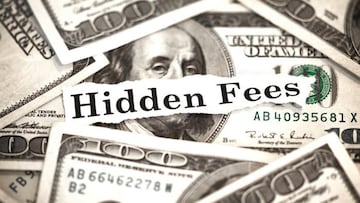What are junk fees and how to know if your banks is charging you?
Seeing fees and penalties applied to your retirement savings, credit card bill, or student loan payment? They could be junk fees. What you need to know.

Are you tired of seeing ambiguous and confusing bank fees drain your accounts? The Consumer Financial Protection Bureau (CFPB) is calling attention to “junk fees and charges” and what account holders can do to avoid and challenge them.
The CFPB defines a junk fee or charge as one that is made after the consumer has already signed up for a product or service. For example, on credit cards, junk charges are excessive fees charged by banks and finance companies.
As the student loan moratorium comes to an end, the CFPB is warning borrowers that they should examine their bills closely to ensure their loan servicer is not tacking on any unexpected or unwarranted fees or penalties. Additionally, to avoid late fees, the agency advises you speak with a representative from your loan servicer to ensure you understand when payments are due, as these companies have been found to obscure these dates.
We’re taking additional action to eliminate junk fees in retirement savings.
— President Biden (@POTUS) November 1, 2023
Here’s what that means: pic.twitter.com/UsiGxb41qX
Examples of “junk charges” made by banks
According to the CFPB, financial institutions typically charge late payment fees when a customer fails to make the minimum card payment by the due date.
The most common “junk charges,” according to the CFPB, are those that relate to late payments, prepaid card fees, and closing costs when purchasing a home. Some others include account maintenance fees, overdraft fees, ATM fees, fees for lost or misplaced debit cards, fees for bounced checks, fees for depositing a bounced check, and fees to cover foreign transactions.
How do you know if your bank is charging you junk fees?
To find out if your bank is charging you unnecessarily, look carefully at the terms and conditions of your account. You can usually find a summary of account fees by logging into your online account or by consulting the financial institution’s product guides.
Additionally, you can check your bank statements to see if you have been charged anything unexpected or notice any unrecognized charges.
Many work for decades toward the promise of a well-earned retirement. Our proposed rule would protect retirement savings from being jeopardized by harmful junk fees caused by increased costs & lost returns that can result from conflicts of interest https://t.co/zNMJanJWQZ pic.twitter.com/IjAEaKfU9r
— U.S. Department of Labor (@USDOL) October 31, 2023
How to avoid junk rates?
Related stories
First, reviewing all the charges when acquiring a service, a loan, a card, or a mortgage is essential. That way, if one surprises you, it can be easily identified. Once you’ve done so, you can ask for an explanation of what any questionable expense covers and can eliminate it if it is unexplained.
If you have problems with a financial product or service, you can file a complaint with the CFPB online or by calling (855) 411-CFPB (2372).

